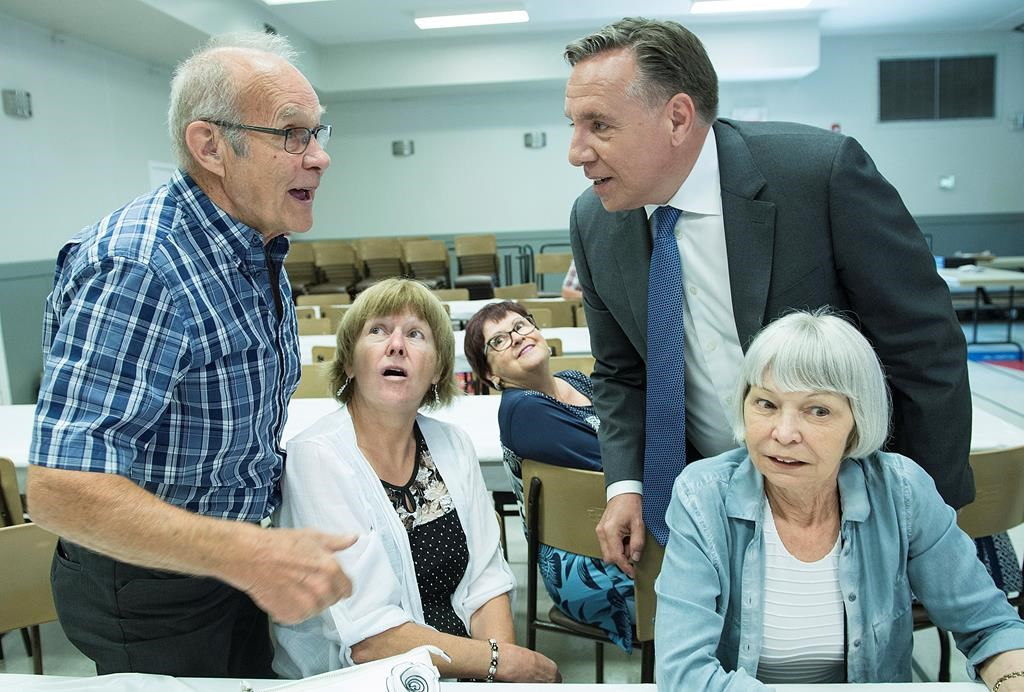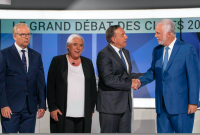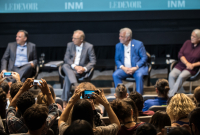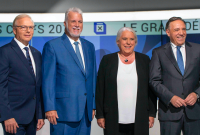Support strong Canadian climate journalism for 2025
Coalition Avenir Quebec Leader Francois Legault said Sunday he was on "solid ground" with his immigration proposals, despite having incorrectly answered a question on the subject.
Legault drew criticism on Saturday after making a mistake on how long a permanent resident had to wait before applying for citizenship.
On Day 25 of Quebec's election campaign, he told a Montreal-area news conference that he wouldn't have been a very good game show contestant, and that he should have researched the question instead of answering.
"Maybe I wouldn't have won 'Genies en l'herbe' yesterday," he said, referring to a Radio-Canada trivia show who name translates to 'Budding geniuses.'
He added that he should have taken the matter under advisement rather than answering incorrectly.
However, he went on to make another mistake when he said Canada's test for new immigrants comes when they apply for permanent residency, rather than citizenship.
"(The test) is before, to have permanent residency, I'll double check to be certain, I'll take it under advisement," he said.
Immigration is a central tenet of Legault's party platform, which includes a proposal to reduce immigration by 20 per cent and require new arrivals to pass a French and values test within three years of arriving as a condition of staying in the province.
Legault said Sunday he'd spent "almost all night" reading about the federal-provincial accord, which he plans to renegotiate with Prime Minister Justin Trudeau if he is elected.
Despite his factual errors, he insisted he was on "solid ground" when it comes to immigration.
Predictably, the two other party leaders piled on Legault for his mistakes again on Sunday, with Parti Quebecois Leader Jean-Francois Lisee suggesting Legault's answers should "disqualify" him from being elected.
"You're not ready to be premier when you don't know the basics of your main file," Lisee said.
Liberal Leader Philippe Couillard, for his part, said his rival only brought up immigration "solely to cause squabbling and division."
Relationships between the province and Ottawa were also a theme for Lisee on Sunday, who ventured into Ontario to pitch his party as the best one to defend Quebec's interests.
Standing outside Parliament in Ottawa, Lisee said he would use the threat of a referendum to scare the federal government and get the best deal for the province — an option not available to the Liberals or the Coalition.
In the shadow of the Peace Tower, he argued that Quebec is being shortchanged some $2.6 billion by Ottawa each year, and that he is the best person to recover the money.
"We're in a relationship of force, and the only argument left to Quebecers is to have a pro-independence party in power, everything else has failed," said Lisee, who has promised not to hold a referendum in his first mandate.
Meanwhile on Sunday, Couillard unveiled a plan to charge Quebec sales tax on all companies that sell goods in the province, including foreign ones.
Currently, Quebec charges tax on Canadian companies and those who provide "intangible goods," such as the streaming service Netflix.
Using the example of Amazon, Couillard said he would require companies outside the country to also register to pay sales tax to Revenu Quebec.
He seemed to have trouble explaining how he'd compel foreign companies to sign up to pay, before finally saying packages wouldn't be delivered unless a company complied.
Legault announced he would spend $1.2 billion per year over five years to renovate and enlarge Quebec's schools, which is lower than the Liberals' planned investment of $1.5 billion.
When asked about the discrepancy, Legault said he could get the job done within the budget he proposed, adding the Liberals' promises were "not credible."
-- With files from Patrice Bergeron in Coteau-du-Lac, Stephanie Marin in Ottawa, and Caroline Plante in Quebec City





Comments